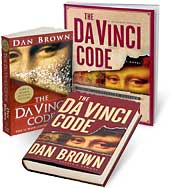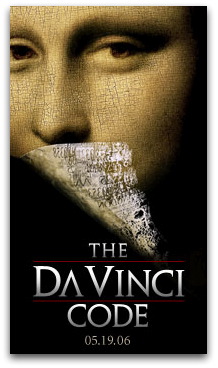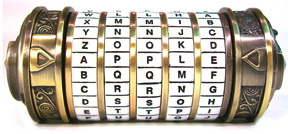Da Vinci Code
Final Thoughts (For Now) on the Da Vinci Code
06/05/2006 03:42 Filed in: Faith & Reason

I had an unusual conversation with an unbeliever (he told me so) this past Friday night. In the course of the overall discussion, he asked me if The Da Vinci Code offended me.
Does it offend me? Good question.
I said that it didn't offend me in my conversation with this gentleman. But I've reflected on his question since the conversation. What are my feelings toward the book?
In the end, I don't think The Da Vinci Code offends me so much as it annoys me.
I'm annoyed at a few things. I'm annoyed at Dan Brown, who is a fairly entertaining writer, for producing a story that is so openly hostile to Christianity. What's the deal, Dan--did the nuns smack your knuckles too hard with the ruler when you were a kid and you're getting your revenge now?
I believe that Brown's book is irresponsible because it completely rewrites known history. A lot of folks say, "What's the big deal? It's fiction!" But it's a big deal because Brown starts on p. 1 of his book with a page entitled "Facts" in which he lists three supposed facts in two paragraphs. Unfortunately, two of the three facts are simply not true. The so-called Priory of Sion is a mid-twentieth century fraud.
But what I believe annoys me most is how gullible some Christians were in regard to Brown's nonsense. Too many Christians said that the books "shook their faith" and made them question the things they thought they believed. And I even heard some folks call into a local radio a couple of weeks ago show who claimed to be Christians but asked what the big deal would be if Jesus actually were married.
This tells me that too many Christians do not know three things as well as they should: (1) their Bible, (2) Christian doctrine, (3) and church history (or perhaps history in general).
If there was ever a question as to the need for ongoing discipleship in our churches, I believe The Da Vinci Code has sadly made the case for it. In one sense, the church responded very well with all the seminars on the subject. We talked about all the evangelistic opportunities that the book and movie brought to us. However, the reality is that we had to scramble to get our own church members up to speed on issues that should have been of an elementary nature.
The church at large needs to completely rethink the way it does discipleship. We need to do more than simply hold weekly Bible studies. We must address all three of the issues I mentioned above.
|
So Dark the Con of MAC (The Apple Computer - Da Vinci Code Connection)
05/24/2006 12:01 Filed in: Culture Watch
The Da Vinci Code (Movie): A Brief Review
05/20/2006 23:53 Filed in: Movies and Television

I have no desire to write a full review of The Da Vinci Code. Everyone seems to be doing that, and most of the reviews are not that upbeat. Here are a few quick thoughts:
I'll be honest, bad theology and bad history aside, the book itself was a pretty good read. Dan Brown made you like the characters, especially Langdon. However, as is often the case, the movie just isn't as good as the book. The movie seems to me to be much darker than I remember the book. The book seemed--dare I say it--fun at times. This movie is not fun.
Robert Langdon will not be a memorable role for Tom Hanks. The movie version of Langdon is fairly two-dimensional and Hanks doesn't seem to have much freedom to expand the character in any given scene. Ian McKellan has the best lines and perhaps creates the best performance. In light of the actor's publicly stated animosity toward the Judeo-Christian tradition, his rant against Christianity toward the end of the movie is very believable.
This may be the only movie to ever reenact the Nicene Counsel. Of course, it's depicted as pure chaos.
I'm not sure if this movie will appeal to those who aren't already interested in the subject. In other words, if a person had no desire to read the book, will he or she go see this movie? Related to that thought, had I not read the book, I would have had great difficulty following certain plot points. Distinguishing between the Priory of Sion and Opus Dei would be a challenge for the uninitiated, in my opinion. And there were a number of scenes where the only reason I could follow the story was because I remembered the sequence of events in the book.
And here's a minor spoiler (look away if it's really an issue for you). What happened to the guy getting the girl? In the book, there's a kiss between Langdon and Neveu that definitely has romantic implications, and a promise is made to see each other again at a planned time. In the movie, there's no such kiss and only a vague promise to see each other again. What happened? Well, perhaps the director, Ron Howard, recognized while filming the picture that there just wasn't a whole lot of chemistry between Hanks and Tautou. Blame the casting director perhaps. Hanks was certainly not the first choice for this movie according to the Internet Movie Database, but I'm not sure anyone would have fared better. However, don't you wonder if there were two different endings filmed?
Personally, if I were Langdon, I would have qualms against becoming romantically involved with the living descendent of Jesus Christ. But maybe that's just me. And I guess if Jesus had descendants, he's really not the Jesus of the Bible, and we could agree that this is a major point of the movie anyway.
Finally, there's a scene at the end of the movie, which doesn't seem to be in the book at all, but perhaps was added because of all the controversy (I'm trying to find the exact dialogue, so maybe I'll come back and update this). Anyway, in one of the final scenes, Langdon says to Sophie, something to the effect, "It's up to you what you believe." And then, "Does it matter if Jesus was human or divine, since he's remembered for teaching love and peace?" Those aren't the exact words, but you get the idea.
Two problems. It does matter what you believe. Truth is not relative. And the theological problem in both the book and the movie is that it creates a false dichotomy between the divinity and humanity of Jesus. Was he a man or was he a God? It's not an either/or. The Bible presents it as a both/and.
Truth be told, I'm a bit weary of The Da Vinci Code. I'm teaching on it Sunday and Wednesday nights because I believe it needs to be addressed within and outside the church. However, based on the response I've heard from a number of Christians who have pondered if the claims in the book might possibly be true, I believe we may need to change our discipleship strategies a bit in our churches. That will be the subject of another blog in a few days.
As films go, If you want a better movie in this genre, go rent National Treasure. Lots of puzzles and codes, better acting and plot, more historically accurate, and much less offensive.
Redacted 5/21, 7:40 AM
Breaking the Da Vinci Code
05/10/2006 15:06 Filed in: Faith & Reason

I've actually not written anything on this blog regarding the Da Vinci Code (book or movie) as far as I remember. I first listened to the unabridged audio book (about nine hours) back in 2003 when it was first released, and then pretty much moved on. I thought the history was laughable then, but knew that it would cause a stir. Now that the movie's coming out in a week, I suppose it's time to address it.
However rather than do that here, I wish to announce that I will hold a two-session seminar at Simpsonville Baptist Church (Simpsonville, Kentucky) on the following dates:
• Sunday, May 21, 5:30-7:30 PM (Part 1)
• Wednesday, May 24, 6:00-8:00 PM (Part 2)
If you're in the area, you're welcome to attend.










